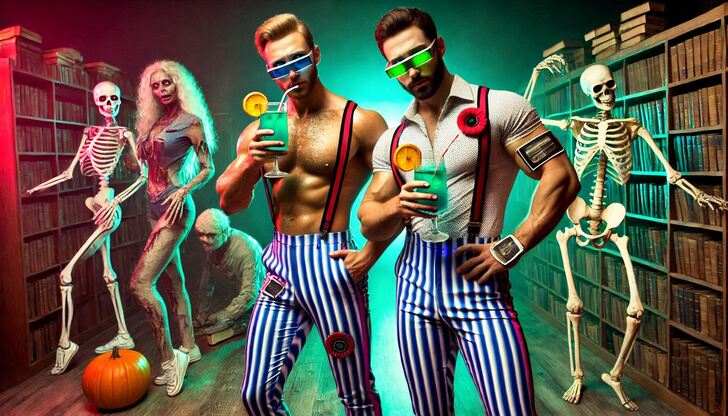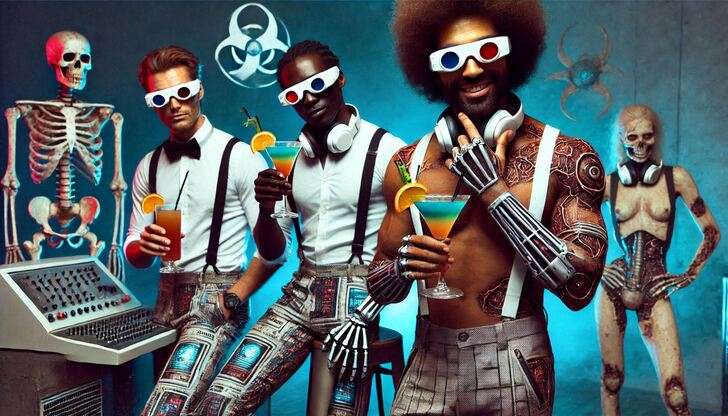Imagine stepping into a world where aliens, zombies, and disco collide. It’s like a cosmic mashup where the universe’s most bizarre elements dance together in harmony. These three themes might seem unrelated at first glance, but they create a fascinating blend of sci-fi, horror, and dance magic that grabs our imaginations and won’t let go.
Aliens often represent the unknown, the enigmatic potential of the cosmos. They might be benevolent beings sharing knowledge or menacing invaders. Either way, their presence in any narrative hints at endless possibilities beyond our worldly experiences.
Then, there are zombies, the ultimate horror staple. While they typically conjure images of terror and survival, throwing them on a disco dance floor adds a humorous twist that flips the script. Suddenly, the brain-hungry creatures are caught under the mirrored ball, grooving to a funky beat, and what was once terrifying becomes a scene of chaotic, comedic relief.

Disco acts as the binding backdrop in this universe. It’s all about rhythm, unity, and plenty of glitter. The disco era was a time when societal boulders didn’t stand a chance against a good party. It made people come together in ways they’d never tried before, tearing down barriers with rhythm and beats.
This crossover into popular culture speaks to our love of quirky surprises and unexpected friendships. It’s this beautiful mess of ideas that keeps people coming back for more, proving over and over that what might be weird also carries a sparkle of genius. Who’d have thought we’d find such unity on a zombie-infested dance floor?
Alien Librarians: Guardians of Cosmic Knowledge
When you think about aliens, libraries probably aren’t the first things that come to mind. But alien librarians? Now, that’s a cool concept. These cosmic custodians might just be the ultimate keepers of the universe’s secrets, guarding tomes that contain the mysteries of galaxies far and wide.
In the realm of sci-fi, alien librarians pop up as fascinating characters who often serve as bridges between worlds. They exist in films, books, and comics, doling out knowledge or deciding who gets access to space’s most precious volumes. Remember, these aren’t your everyday shushing librarians—they’re intergalactic information powerhouses.
Symbolically, aliens in libraries suggest a fascinating blend of order and chaos. Libraries symbolize the collection and preservation of knowledge, while aliens play into the unknown and the unpredictable. This makes alien librarians intriguing symbols of balance, managing the chaos of countless worlds while ensuring that this wisdom is accessible for those in search.
What makes an alien librarian’s toolbox? Picture advanced technologies way beyond dusty card catalogs or typical library systems. Holograms, telepathic archives, and digital matrixes might feature heavily, turning their libraries into the stuff of dreams and amplifying the allure of the role.
These characters challenge us to think about the power of knowledge across the universe. They remind us that no matter where we come from, there’s always something new to learn, someone else holding a piece of the puzzle we haven’t quite figured out. Perhaps in embracing the concept of alien librarians, we’re drawn to the idea that the pursuit of knowledge is itself a universal language, bridging even the widest cosmic divides.
The Undead Beat: Zombies Join the Dance Floor
Throwing zombies into a disco scene adds a layer that nobody ever saw coming. These guys are usually about chomping brains and moving slowly, but toss them into a room pulsing with beats, and suddenly, they have a whole new kind of flair—zombie boogie style.
Historically, zombies have taken quite a journey in the world of fiction. From Haitian folklore to their transformation into movie legends, they’ve been the stars of fearsome tales and epic survival stories. Yet, in this funky dance-off scenario, they let loose in unimaginable ways, offering humor and surprise instead of just fear.
Consider how these slow-moving creatures transform into comical icons on the dance floor. Their moves might lack rhythm, but that mismatch is what makes them so entertaining. It’s the unexpected humor of a wild party with the least likely of dancers picking up the beat.
Symbolically, this reflects deeper societal issues. Zombies often embody fears of conformity, mindless consumption, or societal collapse. Yet here, they’re recast in a more upbeat light—a lesson in not taking life too seriously and finding joy in the most unlikely places.
Mixing zombies with disco delights muddies the predictable waters, teaching us that even the gloomiest figures have a place amidst colorful lights and joyous music. So, it might just get us pondering where else in life we can shake off conventions and have a little fun.
The Disco Vortex: An Arena for Unexpected Alliances
The disco era presents itself as a perfect venue where anything can happen. With its infectious beats and shimmering lights, it’s a setting that naturally encourages people to let their guard down and embrace unlikely friendships. In this scenario, the world of aliens and zombies take the stage, combining their unusual charm and chaos in a dance frenzy.
Aliens, with their superior intellect and advanced tech, stand in sharp contrast to the chaotic, hungry nature of zombies. On a disco dance floor, though, these differences become part of the wild appeal. Imagine alien librarians doing some intricate, coordinated dance routines, while zombies attempt improvised shuffles. This delightful contrast makes the venue an arena of unexpected creative collisions and narrative possibilities.
This setting allows for unique alliances. Picture a team of alien librarians stepping up not just to keep the library safe from zombie hands but also organizing a dance-off to distract and redirect them. Their ability to bring rationality in this disco-ridden chaos shows the necessity of unity even amidst madness.
In the greater scheme of things, the disco becomes a microcosm of modern social spaces. It mirrors the need for cooperation and understanding between wildly different elements—essential lessons for the real world. These dance-floor dynamics might even inspire us to accept and collaborate with those who seem different from ourselves.
What this mix-and-match universe teaches us is that the beauty lies in weaving together differences to create something vibrant. As lights flicker and music pulses in our imaginary disco, these alliances remind us that this harmony, however unusual, is a strength worth celebrating.

Lessons in Unity: What We Learn from Fictional Worlds
In blending aliens, zombies, and disco, a unique narrative unfolds, spotlighting an important message of unity amidst diversity. These outrageous stories show how vastly different creatures can thrive together, highlighting the power of collaboration over conflict.
These strange alliances serve as a metaphor for real-world experiences. In life, we frequently encounter diverse groups of people, each bringing different perspectives. Alien librarians and disco-dancing zombies exemplify how embracing the unusual can lead to vibrant, new dynamics.
Through these tales, the significance of finding common ground becomes apparent. Music, much like these amusing scenarios, can unite us in unexpected ways. It transcends differences, enabling individuals to connect on a universal level, regardless of their backgrounds or histories.
Fiction becomes a mirror reflecting the possibility for genuine togetherness. By observing these bizarre but lovable mash-ups, we’re reminded that unity isn’t just about kinship among the familiar. It’s in learning to harmonize with the strange, the different, and sometimes even the absurd.
So what do our alien librarians and disco-loving zombies teach us? They encourage a reevaluation of how society can value differences and foster environments where cooperation thrives. Amid all the imagined chaos, there’s a deeper lesson—a reminder of the beauty in unity, no matter how improbable it might seem.